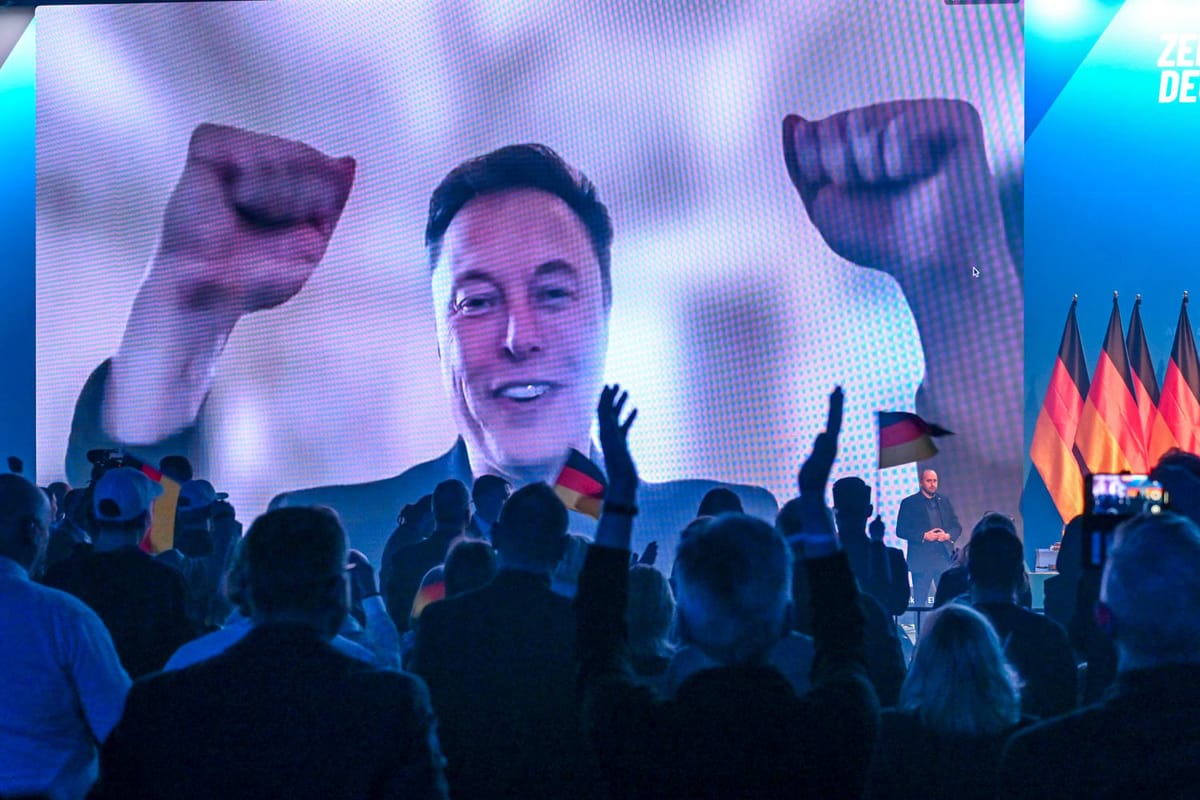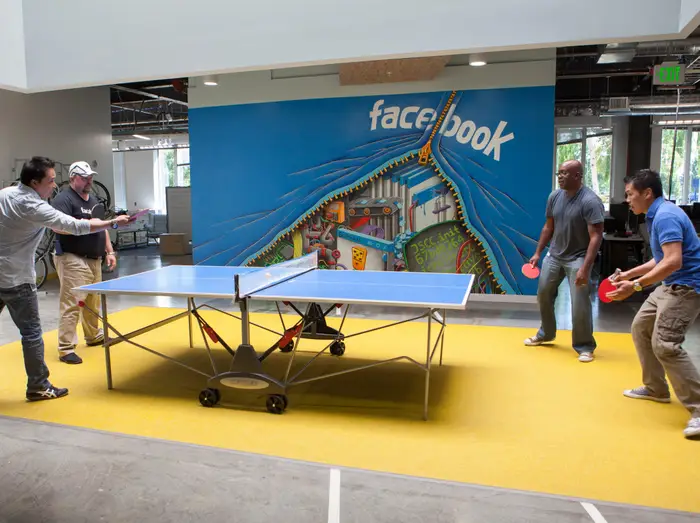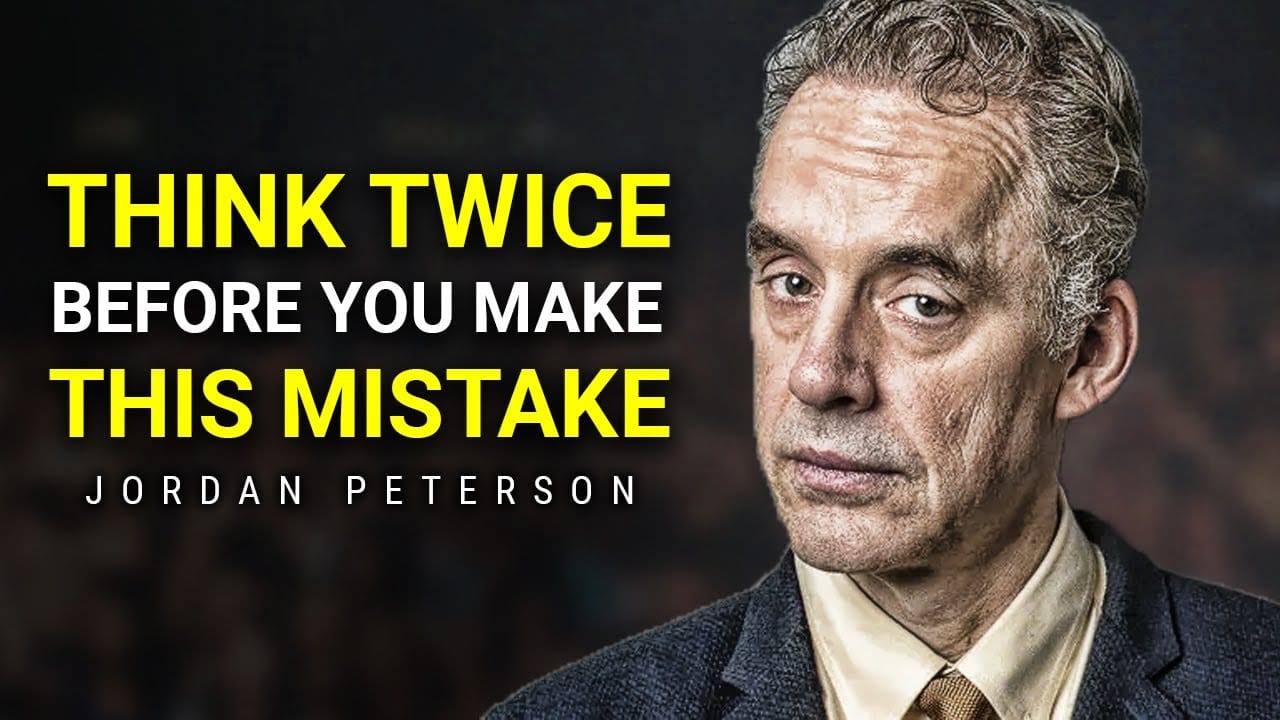The Silicon Reich (Part One)
Silicon Valley isn't giving in to fascism, it's inheriting a fascist social world it already built.

In the hurricane of absurd and terrifying news stories that have marked the ongoing fascist administrative coup, one that lodged itself in the back of my brain was the story that the border gestapo, ICE, was manipulating Google to make it look like more mass deportations were in progress than actually were. Using sleazy SEO tactics from the click-farming websites that had made internet search less and less useful well before AI slop, ICE made years-old stories about deportations resurface to the top of internet algorithms, making it appear at a glance as though many more raids were already ongoing.
This had a knock-on effect on "resistance" news, too: in 2020 someone had tweeted that as ICE agents attempted to enter a greyhound bus, the driver had refused, telling them to "gargle my balls." This anecdote recirculated this week, stripped of the date, shared by people who hadn't seen it or didn't remember it from when it first went viral in 2020.
This Google fearmongering is further evidence that the coup is being driven by mediated terrorization, by frightening, overwhelming and exhausting the public such that they freeze, at least long enough for Trump to consolidate dictatorial powers and Musk to get his hands in the cookie jar.
But it is also a strategy designed to hide a fundamental weakness: namely, that they have a lot of plans at the level of management, legalese, policy and technical administration, but they actually don't have a very deep bench of people on their side and are not well organized on the ground. They are, for now, incredibly top heavy, lacking significant organizational strength and muscle. They don't even have the numbers or resources to do significant nationwide ICE sweeps: not stochastic terrorism, this is SEOchastic terrorism.
The Trump Admin in 2025 is a perfect example of a paper tiger: pure bluster, media and mediated power, controlling certain technical levers and enjoying significant institutional protections, but so far the things that have helped their plans succeed have been universities, hospitals and departments voluntarily enforcing their edicts, and events like Democratic congresspeople not willing to push past a single security guard. But when a crowd with real fury and real intent approaches, well...
Still, the ICE story nagged at me. Although I have spent years engaged in critical analysis and struggle around technology, I'm actually an extremely online person who thinks about the material construction of ideology all the time, and many others who haven't done the same may still find it surprising that the tech oligarchs are all-in on Christian Nationalist fascism. You can see this surprise in the often disappointed or outraged way people talked about the procession of Mark Zuckerberg, Sundar Pichai, Satya Nadella, Jeff Bezos, and Tim Cook to kiss the ring at mar-a-lago.
Indeed, the dominant framing has been that they are "bending to Trump's will", as though these moguls are abandoning some previously held liberal democratic principles and progressive technological optimism, rather than using Trump to do exactly what they already wanted to do. (The fact that they spent billions to get the man into office seems to be more than enough proof that it's the latter.)
But even more radical analyses tend to describe this as a kind of "rainbow capitalism" maneuver, in which they supported progressive causes as long as it was profitable and then withdrew. Such analyses do not go nearly far enough. Well before they funded Trump 2.0, few men had done more to create the infrastructures of fascist power, in both affective and material dimensions, than the leaders of Silicon Valley.
It has been almost two decades since something that emerged out of tech actually transformed the way we live, communicate, and learn. And that last one, the smart phone, has proven to be as much a tool for consumption, alienation, addiction and surveillance as it has been a tool of communication, knowledge and cultural production.
So as Elon Musk and a gaggle of Nazi incel flunkies are currently fiddling around in the code and potentially destroying the material basis of the global economy, I have tried to unify some of these concepts and stories together. I hope this serves as an overview of many of the different ways that Big Tech has produced the world they are now helping Trump turn into a thousand year reich. (And almost all these things long precede the LLM AI scam.) Though there are counterarguments and countervailing tendencies within big tech, the rise of the Silicon Reich shows that the tendencies described below won out against more creative, democratic and liberatory possibilities. Whether those possibilities are even recoverable at this point will be a question of struggle.
Precarity, Union-Busting and Workplace Dictatorship:
- Workers in the Gig Economy (Uber, Lyft, Doordash etc. etc.) do not work for a boss, not really. They work for an app and an algorithm. As such they have even less leverage, control, or possibility of appeal than workers in traditional workplaces. Although workers always figure out ways to subvert or take advantage of the systems that oppress them, the iron metrics of the app (distance traveled, time taken) brooks no appeal and little explanation for error. Workplace rules that might be identical on paper become much more harsh and exacting when the very app itself judges, measures, and determines consequences and penalties, turning workplaces increasingly authoritarian.
- Using their massive profits and VC cash to buy off their engineers and middle management with large lucrative contracts, Silicon Valley leveraged relative employee satisfaction and their status as market innovators to become the gurus of workplace management. From the open-office trend that swept white collar work in the 2010s to the eat-lunch-at-your-desk never-stop-working evangelism of Soylent to the always-on-surveillance devices of the Amazon Warehouses spreading to every inch of the retail sector, to replacing time-off and shorter commutes with in-office "perks" (e.g: the infamous foosball table), to the re-emergence of the company town via the softer-seeming corporate campus, Silicon Valley has set the bar for extreme worker exploitation across huge sectors of the economy, built the tools to maintain it, and designed the management language, strategies and aesthetics to mask its violence. Extremely long hours and compulsory overtime, as typified by "crunch" in the tech-adjacent video game industry, are a particularly toxic example of this trend, but all-hours emails, chats and comms are increasingly common across industries.

- App/Gig Economy technology allows companies to treat all workers as disposable contractors, to hire-and-fire at incredible speeds, creating a level of precarity and insecurity that puts piece-work and day-by-day laboring to shame. As a tech CEO told the Nation, in 2014: “Before the Internet, it would be really difficult to find someone, sit them down for ten minutes and get them to work for you, and then fire them after those ten minutes. But with technology, you can actually find them, pay them the tiny amount of money, and then get rid of them when you don’t need them anymore." Obviously as constantly on again-off again micro-employees/contractors we are both used to being paid a pittance for our labors and don't even notice when we're laboring for someone else's profit (see also: posting on social media), making us much more exploitable and making it much harder to organize. This form of micro-contracting also naturalizes the fact that we have to pay for and maintain our tools – cars, smartphones with active contracts, etc.– further offloading operational expenses onto the workers.
- Apps have long used the Walmart loss-leader model to smash long standing unions, regulations and labor markets across the country: most famously with taxis. For years and years these companies spent investor money without a profit (15 years in the case of Uber) to offer incredibly cheap and relatively convenient services, as well as initially decent pay to new workers – until they accumulate monopolistic market share in a region, at which point they drive prices up and wages plummeted. This has turned back gains made in labor struggles in dozens of industries and also driven the price of goods and services way up (more on consumer-side price effects in a later section.)
- The iPhone, that incredible device which contains all the knowledge of the world in your pocket, stylish, fun and easy to use, was made in factories so miserable and barbaric that the factory managers installed suicide nets to catch the workers who made these technological marvels from throwing themselves to their deaths. Tech's general "gee whiz" effect has been used to invisibilize huge amounts of labor, from the human operants working to make apps' automation look, well, automated, to the traumatized social media content moderators psychically destroyed by a deluge of the worst humanity has to offer, to the poorly paid workers of color who do the extremely manual labor of digitizing knowledge, it's Mechanical Turks all the way down.

- As Malcolm Harris has argued, food delivery and driving apps are "servant apps", some of whose pleasure is derived from the way it turns everyone who can afford to use one into a temporary aristocrat, at least for a little while, because they have a laborer available at the ringing of a digital bell. This obviously shatters class solidarity and breeds resentment between workers and consumers. Though this has been ever-present in retail and customer service, this has become extreme through the apps.
Disinformation, Paranoia and Fascist Propaganda
- During the George Floyd Uprising, traditional modes of repression and movement cooptation were extremely ineffective. What worked, however, was the spread online of paranoia about "piles of bricks" being left by police, fireworks being handed out by the CIA and the FBI, rumors that white supremacists were starting the riots (rumors which were then backed up by police press releases saying they had made arrests on this basis--these stories were never followed up and the arrests were mostly fake). This reached its hideous apotheosis when internet sleuths combed through footage and identified a white rioter who was central in burning down the Wendy's where Rayshard Brooks was killed, and fingered her as a police plant. Turned out, however, that she was Rayshard Brooks' girlfriend, which we learned when police arrested her thanks to these tips. The extreme widespread surveillance of live-streaming and video footage, combined with the paranoia and echo chambers of social media spaces, turned thousands of online "activists" into volunteer pinkertons who repressed the movement much more effectively than Democrats trying to coopt marches.
- Study after study after study has shown that the Youtube Algorithm has consistently produced right wing radicalization, pushing anyone who lets the algorithm roll toward right wing content. But this is true of all social media algorithms, which, built on "engagement", discovered that angry, paranoid, offensive and "contrarian" content gets people worked up and keeps them using the app for longer. There is no reason, of course, that these apps need to be designed around longer "engagement", but it's an easy metric to measure and justify to their investors and shareholders, and which they've eventually all built their growth-at-all-costs revenue models on. If it turns out they generate an entire generation of fascists, sobeit.

- Since social media sites are "platforms", and are not in fact producing the content, they have not been liable for what is present on their sites. However, since these are walled gardens, private businesses, they get to determine what speech counts as "political" and what speech is just "free speech". Meta in particular has a long history of censoring, for example, even very mild pro-Palestinian content, and huge swathes of queer and sex worker content, while being crucial in the rise of Q-anon (Meta banned Q-anon long after other social media companies), the Rohingya genocide in Myanmar, and of course the Cambridge Analytica affair.
- "Learn to code". "Forget liberal arts, do STEM". Decades of arguments against well-rounded educations, including significant financial, political and regulatory attacks on universities (who are, after all, competitors in the fields of applied science, technology and research, and who are most likely to criticize big tech methods) have lead to a proud cultural, historical and literary ignorance among whole classes of workers, thinkers, bosses and industry goons. No wonder they bankrolled the book burning, anti-vaxx, DEI banning campaign of Trump 2.
Destruction of the Media, Killing Culture, Total Marketing
- For a little while in the mid 2010s, it looked like a new age of online journalism and independent media was flourishing. Sure, they were increasingly forced to aim their coverage at Google results, leading to a whole new "SEO" (search engine optimization) industry, since that was how you made ad-revenue. This lead to the emergence of click-bait listicle factories like Buzzfeed. But still, even if the headlines were increasingly obnoxious, and the content churn brutal on writers, it looked like they might at least partially replace the disappearance of jobs at local newspapers. But then all these exciting new journals "pivoted to video". They did this because Facebook told them that video content made multiple orders of magnitude more money in ad revenue and attention than text articles. It looked like it was a path to permanent financial solvency: except that the numbers were completely fabricated, totally made up. Whole newsrooms were reorganized, incredible writers and journalists laid off, only to turn these journals into mediocre video mills that failed within a few years. Long before the conscious billionaire consolidation of the news media and the open fascist war on knowledge, social media had already softened up the playing field.

- Local newspaper revenue had long been driven by subscriptions, ads and by classified sections. This was consistent and community supported, but they often also functioned at an incredibly small margin, one that rarely increased year on year. Papers started to get snatched up and consolidated by mega news corporations in the 90s and 00s, and duplicating articles across markets allowed for cutting reporters, desks and newsrooms. But this profit driven consolidation went into overdrive in the new tech economy. Simultaneously, advertising, whose effectiveness has always been extremely difficult to measure, got almost entirely monopolized by Google, who controlled the ad buying, selling, and designing marketplaces. They also controlled traffic metrics, and so could put extreme downward pressure on advertising payouts, requiring more and more adds cluttering the visual field of the browser and higher and higher click-counts to rate. This lead to bot-driven click farms and automated SEO trawlers dominating the internet, while even good reporting on good sites are plagued with aggressive and unpleasant advertising. Soon paywalls were layered on to advertising, so that what few actually reporting institutions existed became increasingly generalized, increasingly shallow, and increasingly difficult to access, while more and more news became reprints of press releases and wire-services, who were often the only organizations even able to field reporters. The collapse of news, reliable information and analysis has been directly linked to a shift toward far-right populism.
- As the middle class fell out of the writing and journalism industries, a new kind of entertainer, the streamer and influencer, emerged. The few extremely successful influencers at the top, who seem to get paid to "play videogames" or "hang out with their friends", sit atop a mountain of extremely hard working young people, with streamers often working 60 hour weeks on camera, content producers creating dozens of videos a month, almost all of it without staff, institutional support, or often even pay. They are all forced to compete in a brutal and fickle attention economy, one whose profits go the platform no matter who is winning this struggle, and since they are in direct competition with one another (something often visualized within the app, where people with the most viewers are at the top of a physical grid or appear on the homepage), it is extremely hard to organize or unionize. Viewers can also use donations both to control the visual field of the stream, as well as to reward or punish streamers at their whim. This leads to a lot of conformity, mimicry, and "audience capture", all of which tend toward authoritarian modes of circular reasoning, in-group out-group distinctions, and increasingly extreme positions.

- Video and movie streaming has pushed down wages across the entertainment industry (a leading cause of the 2023 strike), lead to the production of algorithm pleasing slop content, designed specifically for barely noticed auto-play, and made movies and TV shows ironically more and more difficult to access across a panoply of different paywalled streaming sites, despite the technological fact that every movie ever made could just as easily be available at the click of a button. Meanwhile, the music industry has accepted miniscule pay-per-play rates which have absolutely destroyed the capacity for most musicians to make a living in exchange for steady returns on old investments. This has led to the emergence of "ghost artists"– fake DJs who are actually just Spotify corporate repackaging generic studio produced music to add to their playlists and streams, thereby doubling their payout, as well as reenforcing the emergence of constant covers of decades old rock hits, all of which is based on a copyright-exploitation loophole. The result is a stagnation of mass culture, the impoverishment of artists and creatives, and the general hollowing out of artistic experience.
- At the same moment that artists are being impoverished, massive corporations insist on the sacrosanct nature of their eternal copyright. While our art and creativity gets hoovered up for content farms, listicles, "original reporting" and AI model training, corporations have installed automated systems that will nuke your work from orbit if a computer so much as sniffs a bit of "infringement". In so doing they have destroyed fair use doctrine, and made a world in which we all reflexively and unthinkingly respect intellectual property rights, censoring our own capacities for creativity, remixing, repurposing and detournement.
Naturalization of Self-Surveillance, State Power, and Learned Helplessness
- Algorithmic recommendation systems, from Spotify personalized playlists to Products People Like You Bought to the TikTok ForYou page to the Netflix Next Up, we have learned to equate being surveilled with being known, recognized and understood. The undeniable convenience and usefulness of GPS and navigation systems has made all of us feel not just ok with, but actively grateful for being constantly tracked as we move through the world. In the name of opening our phones that little bit faster we give massive corporations our biometric data, fingerprints and face scans. For the ease of voice activation we consent to constantly being recorded. We believe that standing, bystanding and filming an activist doing something is of equal political importance to the action itself. The ideology, widespread adoption, and purposely structured addictive dopamine of likes and shares has not only made us happily and voluntarily create corporately held databases of pictures, recordings, confessions and political opinions, has not only made us curate, spread and publicize our personal conflicts, traumas and fears, but it has made us intermingle those processes with our most deeply held values of friendship, love, solidarity and struggle. The secret police of 20th century authoritarian regimes could only dream of having a society of such avid, skilled, reflexive, voluntary snitches.
- The proliferation of home security camera systems, Elfs on the Shelf and nanny cams, camera doorbells, smart home systems, and the "internet of things" which deposits web-connected sensors in your appliances, has lead to an increasingly militarized and defensive concept of the home, a kind of technological Castle Doctrine. By looking at it through a camera feed, and the ideological process of hiring and paying a home surveillance/security company, the home becomes a site of intense anxiety, threat, and subversive possibility: false alarms, fear of crime, suspicion of anyone who dares approach the house. Paranoia, fear of crime, fear of the public and the other, and extreme protectiveness over the home/homeland are all core components of fascist psychology.

- Computers, apps, platforms and websites are entirely black box tools: most of us don't know how to use them, indeed, technological skill is mystified and made inaccessible, which maintains a labor-aristocracy around coders and technologists and disincentivizes becoming a pirate or hacker--of using the tools toward our collective liberation rather than the profit of the developers and owners. Apple's fetish for fully unmodifiable design is well known, but we are not allowed to repair, modify or transform most of our most expensive possessions: in an ideological victory over language we call it "jail-breaking" your device. This lack of knowledge makes us vulnerable to scams, misinformation, and manipulation, but it also makes us dependent on the rightful authorities, and their closed monopolistic systems, to achieve basic functions. Reliance on high tech devices for our everyday social reproduction teaches us to be both helpless and compliant, good authoritarian subjects.
- Once or twice a year we find out our data has been breached and given to criminals because we bought some underwear from a random online retailer years ago, and as compensation we are offered 6 months of an "identity protection" service we already have running from the last time. Corporate systems store vulnerable sensitive data extremely poorly, but it is us who face identity theft, we who are forced to get password managers and remain ever vigilant about our digital security at the same time that we now need to log-in to an app to do even the most basic functions of daily life. Rather than beef up their services, they ask you to "prove you're not a bot", which a study showed this month has been a global time-theft on an unbelievable scale. The incredible profits they reap from this data is used not to improve services or hire more support, but to create automated phone-trees and chat-bot systems that leave us helplessly circling byzantine menus in computerized deadzones, so that every small error they make now costs us hours of our life. We are constantly facing, in an immediate and emotionally draining way, our extreme helplessness in the face of systems. This technique of "administrative burden", perfected by neoliberal government bureaucracies punishing welfare and disability assistance, has been universalized by big tech. We learn to despair of things ever getting better, or problems ever being solved.
As I began putting this post together, I realized it was becoming a compilation of a decade of thinking–honestly, this could be a whole ass book–and so I've decided to split this into parts. Next week I will publish part two, which will feature sections about the Housing Crisis, Rent and Gentrification; Scams, Ponzi Schemes and Financial Boondoggles; High Prices, Shakedowns and Turning Owners into Renters; Consumerist Identity, Algorithmic Individuation and Alienation; Racism, Colonialism, and White Supremacy; and Ecological Destruction and Eco-Fascism. Fun!
At the end of the two-parter, you'll never fall for the ole "these guys would do diversity and justice if it weren't for Donald Trump, and that's why they have a display case full of skull-measuring calipers in their office" again.





